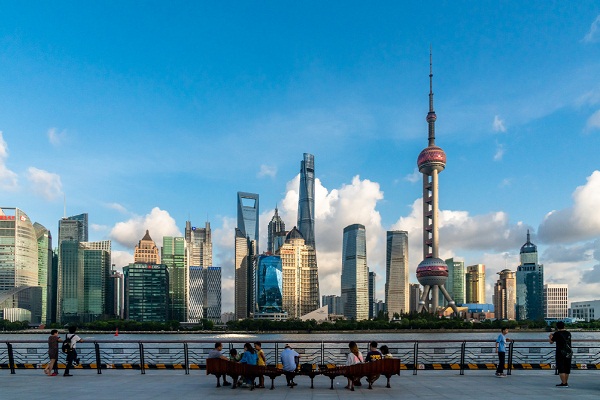China's sustainable growth key driver of global economy
By Helen Han | China Daily | Updated: 2023-11-16 07:52

China's recently released economic report shows that the GDP in the first three quarters of 2023 registered 5.2 percent growth. China has just announced a 1 trillion yuan ($137.38 billion) national government bond to plug the investment gap in the regional disaster relief efforts. Despite real estate and debt issues, China's economic growth will be sustainable and strong, and it will remain the key driver of global economic growth.
China aimed to have an "olive shaped" society with the bulk of GDP growth benefiting a large middle-income group, therefore "common prosperity" becomes a very important goal.
Investments in modernizing rural agriculture, eco-cultural tourism and digitalization of the infrastructure will further boost the rural township economy. Young migrant workers will prefer to go back home to work in the companies in nearby towns. It has been observed that since 2018, the economy of "small-town youth" has been an important factor pushing up consumer consumption, much higher than that in the first-tier cities. Entrepreneurship, cultural development and vitalization, beautiful villages, green mountains and emerald waters will further boost the quality of rural vitalization in China, and a bigger middle-income group will emerge from the efforts.
China's consumer market's growth is propelled by e-commerce, data-driven consumer technologies and deeper penetration of the many mega city clusters in China. In 2022, China's online goods sales reached 12 trillion yuan, while that in the US was $1.03 trillion. With the leading e-commerce and world's largest consumer data collection, more advanced data-driven consumer technologies further enable companies to optimize the products in the market, boosting consumer demand. China also planned 22 mega city clusters for further urbanization to expand the consumer market. It is estimated that mega city clusters will account for over 70 percent of consumer consumption growth, and according to McKinsey Insight, by 2030, the Chinese working age urban consumers will contribute to 18 percent of global consumer consumption growth.
With the increase of the new middle-income group, higher quality life style is in vogue. Other than obvious electric cars, smart phones and consumer goods, new demand will revolve more around experiential, cultural and healthy living. The young people of China need more than Karaoke and TikTok. They prefer travel to see the country and the world, engage in sports activities, create new things, express themselves and have access to deeper knowledge and new ideas. They also crave to be part of China's national rejuvenation and a citizen of the world. All these new demands are huge potential growth areas.
China is currently accelerating digitization in all sectors and every economic aspect, particularly smart manufacturing and artificial intelligence in manufacturing, embracing the Internet of Things, AI, blockchain, cloud, data and 5G. New technologies and digital economy are also boosting agriculture and county level economic development by improving output, reducing cost and commanding higher price based on brand value as well as improving overall management efficiency. Software development for lifecycle management, production process management, private traffic system for digital marketing and brand value building, as well as digital talents training and development are the areas in focus. This level of intensity and investment have never been seen before.
China has long planned and invested in innovation. The result is quite impressive. It has achieved a leading position in solar energy, electric cars and lithium batteries. Other leading technologies include high-speed rail, high voltage power grid, 5G, AI, super computer and space science, just to name a few.
While the centralized digitalization and innovation efforts are bearing fruit, it is also important for China to foster an innovation ecosystem, with the greatest innovations sprouting from small startups. China is still relatively early in building its robust innovation system, and it will promote more grassroots startups that can really bring the most innovative ideas to reality.
China ranked No 3 in outbound foreign direct investment, which reached $146.5 billion in 2022, surpassed by Japan, while the United States leads with $373 billion. China's share of outbound investment is still relatively low considering its economic position in the world. With the Regional Comprehensive Economic Partnership, the Shanghai Cooperation Organization, Belt and Road Initiative and newly expanded BRICS as well as the G20, China further strengthens its regional and global economic cooperation, trade and direct investment across the world.
China's development-based BRI investment philosophy aims to help particularly developing countries build up their infrastructure, modernize industries, agriculture and accelerate digitization. It emphasizes on long-term development and life quality improvement of the local people than short-term return on investment. By developing the infrastructure and digitization, trading of consumer goods, food, industry equipment and raw material all become accessible.
With the rapid development of the internet, AI and other technologies, globalization is increasingly taking the form of easy global access of commerce, people-to-people exchange and faster capital flows, and global integration of knowledge and ideas. However, hindered by protectionism, geopolitics, friend shoring and populism, globalization is facing the danger of regression and regionalization. Further opening up China's market to international investment and cooperation, taking higher level of global development, and addressing all people's needs of improving lives are the path to a sustainable global economy.
New quality growth revolves around several key words such as innovation, harmony, green, openness and sharing. China is striding confidently with these words at heart, bringing prosperity to its people while leading the global economic growth to a new level.
The author is the founder and chief executive officer of IMT Management Tech Consultancy and chief growth officer of Smart Factory Kunshan.
The views don't necessarily reflect those of China Daily.
If you have a specific expertise, or would like to share your thought about our stories, then send us your writings at opinion@chinadaily.com.cn, and comment@chinadaily.com.cn.
























